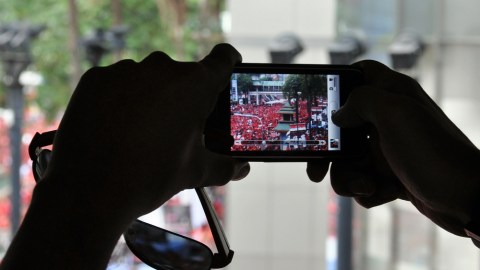Your iPhone Could Be Arming Congolese Rebels

What is the Big Idea?
Tacked on to the end of the lengthy Dodd-Frank Act, which imposed new government safeguards after the U.S. financial crisis, there is an unusual provision that requires publicly traded companies whose products might contain minerals from the conflict-ridden areas in Central Africa to report to shareholders and the S.E.C. if their mineral supply comes from the Democratic Republic of Congo.
“The measure is aimed at cutting off the brutal militia groups that have often taken over the mining and sale of so-called conflict minerals to finance their military aims,” according to The New York Times.
While most companies affected by the law support the measure, businesses are pushing for lengthy phase-in periods and minimal use of the minerals. Lawmakers, electronic makers and international aid groups have been grappling with this debate in recent months.
What is the Significance?
Almost all consumer electronic part uses some form of four major minerals:
“We don’t think you need to have people being killed in order to have these metals in our cellphones,” Corinna Gilfillan, head of the United States office of Global Witness, told The New York Times.
While the folks in Washington duke it out, delay implementation of the provision and entrench themselves in hundreds of meetings, the mineral embargo is having an unintended and negative effect on the traders and diggers in the Congo.
“It is causing, I would say, a sort of embargo on traders and diggers in Eastern Congo,” Serge Tshamala, an official at the Embassy of the Democratic Republic of Congo. “The longer it takes the S.E.C. to come up with guidelines, the worse it is for our people.” Mr. Tshamala and other Congo government officials met with the agency’s staff members in June, urging them to speed completion of the regulations.
This debate is adding another layer of complexity and controversy to the manufacturing of electronics, particularly Apple products. Foxconn, which makes iPhones and iPads made headlines recently for its harsh working conditions at its huge manufacturing plants in China. There was a series of suicides at Foxconn in 2010 and an explosion killed three workers at its Chengdu location.
While Mike Daisey’s falsified report on This American Life has taken some of the heat off the company, their working conditions are still being called into question and labor groups, shareholders and investors say they will continue to monitor its treatment of workers.
Apple has been innovators of slick electronic products, but they have less than stellar environmental practices. They have consistently lagged behind competitors, particularly HP and Dell, in environmental programs such as recycling computers, phasing out toxic chemicals and ensuring transparency and a willingness to talk to environmental groups.





